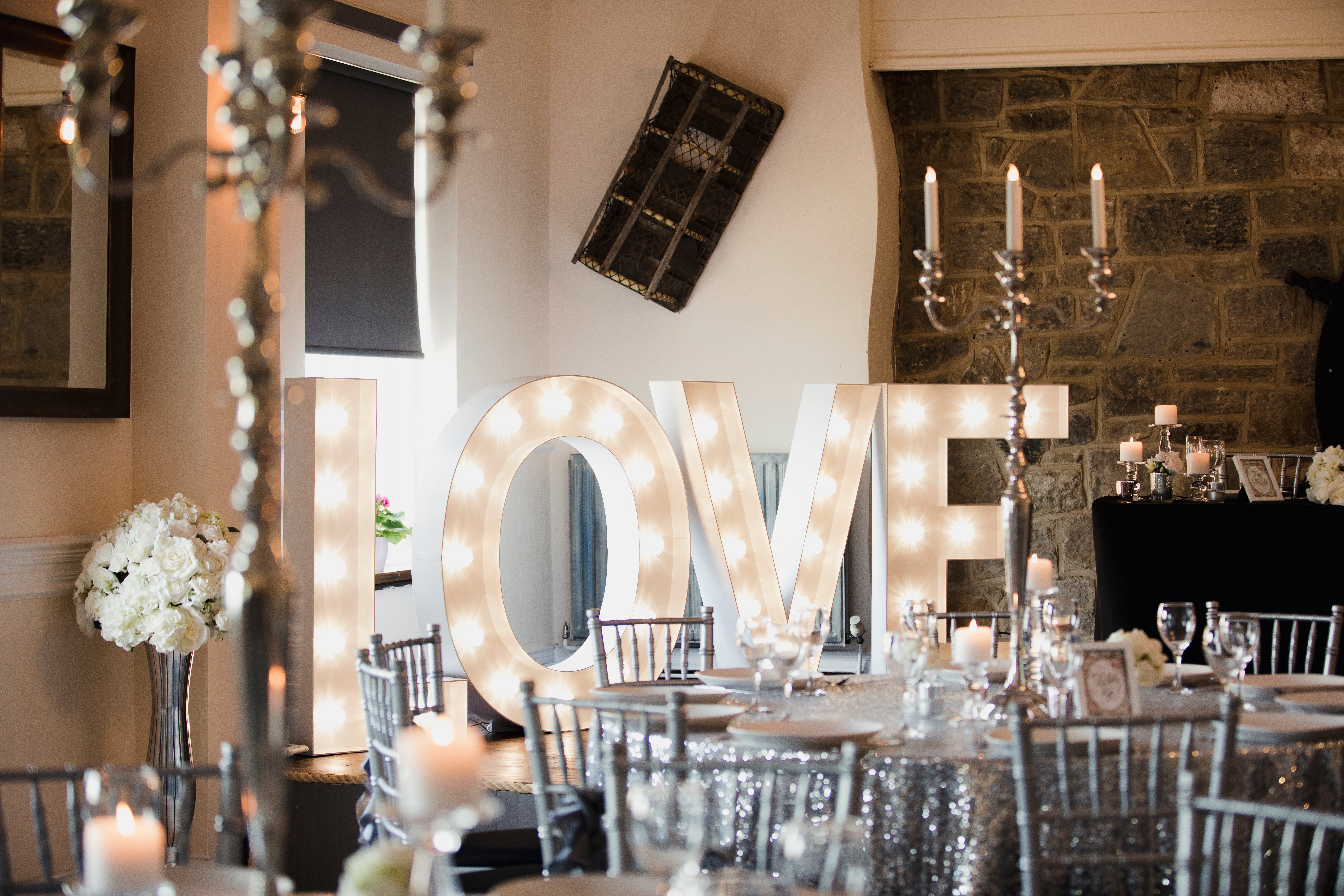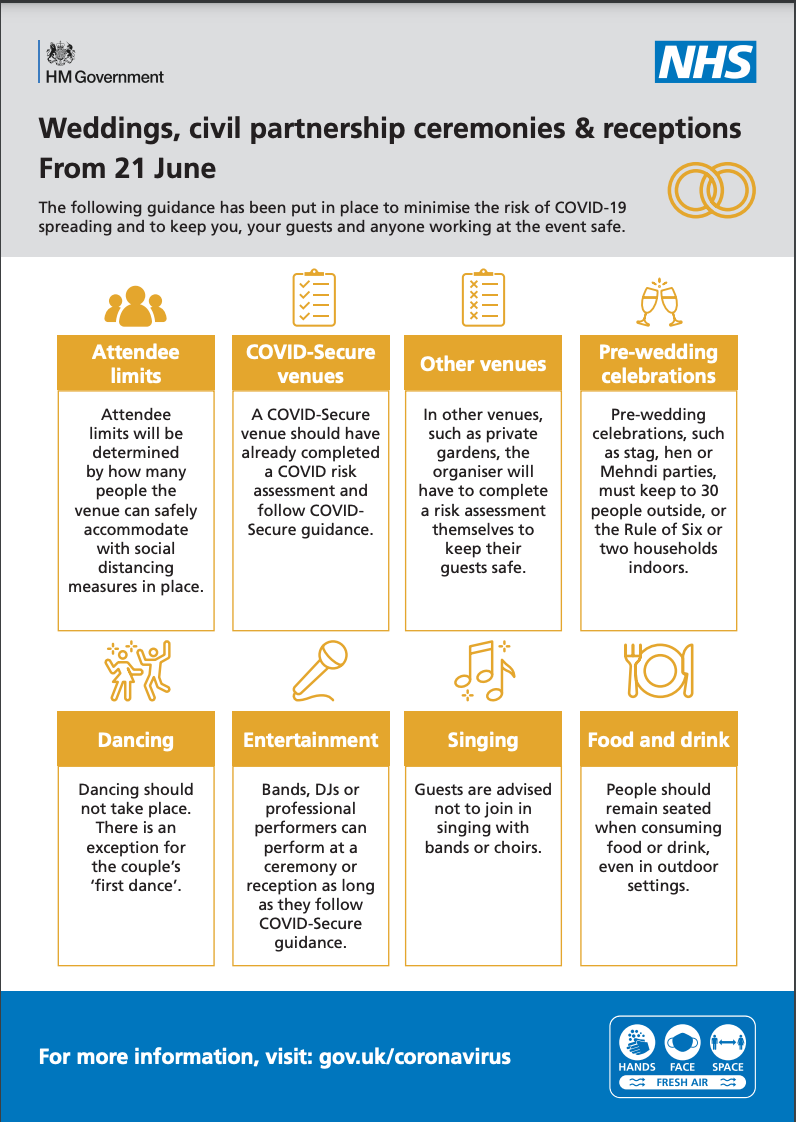‘We’re hopeful our big day can go ahead as planned’: What new Covid wedding rules mean for couples and guests

Couples planning a wedding or civil partnership ceremony during the pandemic have endured an anxious 16 months, with strict rules having caused significant disruption.
But the easing of restrictions this month to allow an unlimited number of guests means bookings can now be made with a little more certainty in England.
In removing the cap on attendees, the government says it is recognising the sacrifices that have been made – and the need to get back to some form of normality.
Since 21 June, capacity restrictions on weddings, civil partnership ceremonies, receptions and commemorative life events such as wakes have been lifted.
The changes allow people to celebrate their union with families and loved ones while also aligning the wedding sector with the way other Covid-secure venues – such as restaurants and pubs – operate.
However, there are still rules in place for organisers and guests, including ensuring social distancing can be adhered to and submitting a coronavirus risk assessment before the big day to work out the capacity limit for each venue.
Ed Gallagher is marrying his fiancée, Alice Griffiths, in September. The couple, who live in Chalfont St Giles, were forced to postpone their wedding because of Covid but are hopeful that the event will go ahead as planned – and with their guest list intact.
“Trying to plan our wedding has been incredibly tough,” he said. “The rapidly evolving Covid rules plus the threat of extended lockdowns has made organising it all quite stressful, and we have already had to postpone our wedding once.
“It is now going ahead in September but we’re still uncertain about whether there will be a full easing of the rules by then, or whether certain measures will still be in place, such as masks and social distancing.”

He added: “That said, we are encouraged by the announcement that there will no longer be limits on the number of guests. At least we won’t have to cut back our guest list!
“We are of course more than happy to implement any Covid precaution which will keep us and our guests safe, whether that is testing before the wedding day or registering with the track and trace service – although we’re not yet sure whether that will be a solution.
“We’re really hopeful that the situation improves sufficiently to allow the wedding to go ahead as we had always planned.”
The main advice to those organising – or attending – weddings in the coming weeks is to remember the government’s Hands, Face, Space, Fresh Air guidance and to get tested regularly.
Wedding businesses are also adapting how they operate to ensure they abide by the rules. This includes determining the capacity of indoor venues, liaising with guests on the restrictions that are still in place and completing a risk assessment.

Below we outline some of the questions couples, guests and organisers may have about an upcoming event.
How can I make sure my Wedding is COVID safe?
- Continue to practice Hands, Face, Space, Fresh Air guidance before, during and after the day.
- Get tested twice a week before and after the event, even if you don’t have symptoms.
- Anyone displaying symptoms should not attend, immediately isolate and get tested.
- Anyone planning on hosting a wedding ceremony must complete a Covid-19 risk assessment of the venue before the event takes place to establish how many people can attend.
What is the limit on the number of attendees?
- There will no longer be limits to venues. Instead it is up to the event organisers to determine capacity limits with social distancing in place. This will be based on a Covid-19 risk assessment of the venue that must be conducted prior to hosting the event.
How do I know how many people can attend my wedding, civil partnership ceremony, reception or commemorative event if I am organising it myself?
- If you are organising the event in a Covid-secure venue, the venue manager needs to tell you how many people can attend socially distanced and in a safe way.
- If you are organising the event in another venue, such as a private garden, you must determine how many people can safely attend whilst also maintaining a safe distance from each other (1m with additional mitigation such as being outside or 2m) by conducting a Covid risk assessment that is is available on the Gov.uk website.
Do I have to fill in a risk assessment?
- It is a legal requirement for a Covid-19 risk assessment to be completed for the venue at which a wedding, civil partnership ceremony, reception or celebration is being held. This will generally be undertaken by the venue manager or event organiser.
- Failure to provide a completed risk assessment if asked, could result in a £10,000 fine. Those responsible for organising an event must also take all reasonable steps to ensure the event takes place in a safe and secure way.
What if my ceremony and reception are at different venues?
- If your ceremony and reception are at different venues they should be considered separate events and appropriate risk assessments must be carried out for both venues.
- For example if you have a ceremony at a Covid-secure venue that can accommodate 75 people and you wanted to invite the same number of people to attend another venue for the reception. You would need to make sure that both venues had had a risk assessment carried out.
Can I have a Hen or Stag Do?
- Yes, in line with wider social contact limits (six or two households indoors, 30 outdoors), you may still go ahead with a pre-wedding celebration. However, in the run up to wedding or civil partnership you may want to consider reducing social contact to reduce the likelihood of contracting Covid-19.
- If you do want to hold such events within the social distancing guidelines we suggest holding them well in advance of your big day, so that if there are any infections they can be picked up. You can reduce your risk further still by asking everyone to take a test before meeting up, and taking up the offer of a vaccine.
Are there restrictions on entertainment – live bands for example?
- Bands, DJs or professional performers can perform at a ceremony or reception as long as they follow COVID-Secure guidance.
- To minimise risk of droplet and aerosol transmission from the combined attendees including the performer/s, audience, wedding party and associated staff and site providers, outdoor performances are always preferable.
Can dancing take place?
- Dancing is not advised due to the increased risk of transmission. There is an exception for the couple’s first dance. Dancefloors and other spaces for dancing must remain closed but can be repurposed ensuring this is aligned to social distancing guidelines.
Can singing take place?
- Guests are advised not to join in singing with bands or choirs due to the risk of transmission.
Does table service need to be provided? Even if I hold the event in my own garden? What about if I provide the food/drink myself?
- Businesses providing food and drink at these events must take all reasonable steps to ensure people remain seated while consuming food or drink, even in outdoor settings to help limit the risks of transmission.
- At venues where alcohol is served, businesses/caterers must also take reasonable steps to ensure people order and are served whilst seated. These restrictions also apply where events are held in gardens of private homes, where catering is provided by a business.
- These measures should also be followed where you are providing the food and drink yourself at the event. Buffets should not take place.
Are the rules different for areas with high transmission of the Delta variant?
- The rules are the same across all areas in England.
- If the event is taking place in an area where the new variant is spread fastest, everyone should recognise the extra risk.
Do easements affect other significant life events?
- Easements will also affect wakes, bringing these rules in line with existing rules on funerals so people can say goodbye to those they have lost.
- Alternative wedding ceremonies are permitted in line with the same rules as weddings or civil partnerships.
- Baptisms, bar mitzvahs and other stand alone events can already take place with a limit of up to 30 people. Restrictions still apply in these events to help manage the transmission of Covid-19.